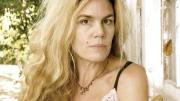Dogs do figure mightily in Underdog, the fourth collection of poems by Katrina Roberts ’87. In “Cave Canem,” for example, a meditation on, and reimagining of, the volcanic denouement that doomed Pompeii, the narrator speaks of
…my quiet urgings to the children accompanying me in
my tasks, this August 79 AD always dogs
and at Marcus Vesonius Primus’ gate one whose collar
glints with studs of bronze—until he sees me
for who I am, simply knocking
to retrieve laundry.
Such lines, stitching together a domestic task, a family moment, an historical backdrop, and a geologic cataclysm, suggest the texture of this collection, whose underdogs are not limited to the four-legged kind. They include a solitary 90-year-old Chinese immigrant who died in Walla Walla in 1957; a grasshopper frozen before a kitchen door, waiting to dare a leap to freedom; a cancer-stricken mother of a six-year-old boy (“There’s no remission, he knows, despite the tufts blooming beneath her kerchief”); French prisoners in Wales, circa 1807, building a model guillotine from sheep bones; urban Chihuahuas set to barking by a police siren; and even herself and her own vulnerable offspring (“…when I leave my children hungry for attention and drive myself to the ER a random Wednesday evening because I can’t take a full breath for pains in my chest—”). Indeed, we are all underdogs.
The poetry, though infused with compassion for beings caught between rocks and hard places, doesn’t plead their case in abstractions, but pinpoints the heartrending details of their predicaments. In “Whiskey,” she describes the common mid-nineteenth-century British “turnspit dog”:
scorching heat, how tantalizing
the waft and crackle of browning meat, oozing
juices….To be caged within
a small wheel attached to the spit (fire
so near!) and made to run, saving the cook
in a large household hours of effort
in cranking by hand—your fate. Whiskey
ran and ran (such a tiny thing!) so
they all ate and ate.
Roberts’s poems sometimes flex a large vocabulary—the grasshopper poem is titled “Entelechy,” an earlier one is “Sfumato”—and in other cases draw on carefully targeted research: “Ground Water, Enchanted,” spreads across five pages, its lines studded with two dozen italicized Chinese proverbs (“No matter how tall the mountain, it cannot block out the sun”). Her first book, How Late Desire Looks (1997), whose title poem first appeared in this magazine and was anthologized in Best American Poetry 1995, spun glittering beadworks of the poet’s nuanced imagination. The Quick (2005), rooted in her experience as a mother of three children, was “an exploration of creation myths,” she says. “Threaded through that, there are these moments of looking back toward Greek mythology and Welsh mythology—and re-envisioning what one’s own creation mythology might be.” Friendly Fire (2008) is all sonnets, each with a one-word title and each distilling a shard of experience that resonates beyond its particulars.
“Firstborn” from The Quick illustrates how a contemporary poet can respond to an inhumane incident occurring halfway around the world; it’s a found poem taken from a 2002 New York Times report on starving Afghani parents who sold their children for wheat in order to survive. “I had just had my first boy,” she recalls. “And we live here [in Walla Walla] in the midst of wheat fields, and bread baking is important to me. I was thinking about wheat, and about this small loaf of a child I held in my arms, and then about these mothers who had to trade some of their kids in order to stay alive. I was interested in how the poem might function personally politically, as well as in a social sense.”
Underdog repeatedly probes the theme of immigration—of aliens, in the broadest sense, discovering themselves in unfamiliar environments. We meet gandy dancers laying the transcontinental railroad (“Someone swung to hit a gold stake/and missed”); a lonely miner in Oregon, 1919 (“Somewhere, a mother’s arms encircled me if only/for months awaiting my birth”); a predatory raccoon family that ravages half the poet’s flock of hens overnight; three Mexican immigrants waiting in the local post office (“...Lo siento, one nods/our direction, his poncho—picture a simple wheat-colored/chasuble, like a solar system’s oval with a hole in the middle/for a head to pass through—”). And always, the ceaseless invasion of our planet by human babies, those souls groping so poignantly to find their way in this world.
The book’s opening poem, “From Po Tolo to Emma Ya,” climaxes in a synopsis of the cosmology of the Dogon millet farmers of Mali, who believe that all Earth’s creatures are, in essence, immigrants from the distant Sirius system. The poem’s title invokes the names of two stars in the constellation Canis Major, where Sirius, the Dog Star, resides. “Sirius—twice as large as our sun and twenty times as radiant/is axis of their universe from which all souls emerge in a great spiral.” The poet declares this Dogon narrative “...well, as credible to me as any dogma,” and it becomes the subtext for a vision that extends eons past the human life span, in both directions. “We’re treading this earth’s skin/,” she concludes, “leaving imprints, and afterimages however ephemeral for whomever/comes after.”
Roberts (www.katrinaroberts.net) studied with Seamus Heaney at Harvard and with Jorie Graham (now Boylston professor of rhetoric and oratory) at the Iowa Writers Workshop. She is Schwabacher professor of English and the humanities at Whitman College, and she and her husband, Jeremy Barker, also make wines at their Tytonidae Cellars and distill spirits at their Walla Walla Distilling Company. Her life, like her work, resists categorization. “All human life astounds me,” she says. “That any of us exist is miraculous.”









